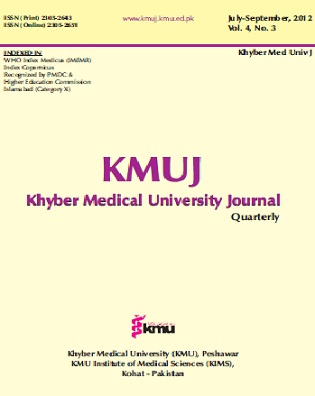CARDIOPULMONARY RESUSCITATION IN THE LIGHT OF NEW 2010 AMERICAN HEART ASSOCIATION GUIDELINES: A SURVEY AMONG HEALTHCARE PROFESSIONALS OF TERTIARY CARE HOSPITALS IN PESHAWAR CITY
Main Article Content
Abstract
Objective: To evaluate the basic knowledge and practice of cardiopulmonary resuscitation (CPR) and the new changes in 2010 American Heart Association (AHA) guidelines for CPR amongst healthcare professionals (doctors and staff nurses) in tertiary care hospitals of Peshawar.
Methodology: A structured self-administered questionnaire based on 2010 AHA guidelines of CPR, was used to test the knowledge and practice of CPR among participants. A correct response rate of >70% to a question was considered as excellent awareness, 50-69% was considered as satisfactory awareness while a response rate of 30-49% was considered as poor and <30% as very poor awareness.
Results: A total of 345 staff members including 165(40%) staff nurses (SNs), 90(30%) house officers (HOs) and 90(30%) post-graduate trainees (PGTs) participated in the study. Regarding the basic knowledge and skills of CPR, response rate was classified as satisfactory awareness. In the groups 52.66 % of HOs, 70.96% of PGTs and 58.8% of SNs responded correctly. The knowledge and skills about pediatric CPR, response rate was classified as satisfactory awareness. In the groups 52.23 % of HOs, 63.33% of PGTs and 45.96% of SNs responded correctly. The knowledge about new changes in AHA 2010 guidelines for CPR was classified as poor or very poor awareness. In the groups 26.34% of HOs, 46.94% of PGTs and 22.60% of SNs responded correctly.
Conclusion: Doctors and nurses in the tertiary care hospitals of Peshawar city had satisfactory knowledge about CPR; however their knowledge was poor regarding the newly published AHA 2010 guidelines for CPR.
Key Words: Cardiopulmonary resuscitation, knowledge and practice, healthcare professionals.
Article Details
Work published in KMUJ is licensed under a
Creative Commons Attribution 4.0 License
Authors are permitted and encouraged to post their work online (e.g., in institutional repositories or on their website) prior to and during the submission process, as it can lead to productive exchanges, as well as earlier and greater citation of published work.
(e.g., in institutional repositories or on their website) prior to and during the submission process, as it can lead to productive exchanges, as well as earlier and greater citation of published work.
